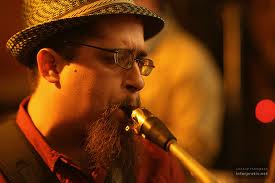Interview with Dan Oestreicher, currently with Trombone Shorty but also, saxophonist at large
Dan Oestreicher first hit the radar for this writer when he presented himself at a Naked Orchestra show at the Mermaid lounge and made clear that he should be playing with the group. He did that for the rest of that evening and for a long time afterward.
He played with many of the most forward thinking New Orleans musicians and frequently he is there right when they are looking the most forward. This includes the The Other Planets, The Magnetic Ear, 3 now 4, James Singleton, Irvin Mayfield's New Orleans Jazz Orchestra, Roger Lewis's Baritone quintet (where Dan is playing Bass sax instead of his more heard, Bari sax,) The Naked Orchestra, The Jonathan Freilich group, his own group- The Diesel Combustion Orchestra, and more. He is seen playing some tuba and really tends to go very deep when he is exploring anything, but especially music. He also knows a good deal about saxophone lore and trade as well as the other end of the spectrum, analog synthesis.
As he is in Trombone Shorty's band, touring constantly, he is in a unique position to discuss the current meanings and associations in the idea of New Orleans music (if there is really such a thing at all) and improvisation. His perspectives are well informed and if nothing at all show a blazing mind for inquiry and a fearless and healthy statement of opinion. He could go anywhere from here. If you were into horse racing you might see him listed in the racing form as one to watch.
...Look to the end for heated debate.
The Interview (5/2/12)
Part 1-What Dan is up to now; the Roger Lewis baritone sax quartet+ bass sax; Roger, Tony, tim green, calvin johnson, shannon powell; jazzfest as a showcase for acts that aren’t playing around very much; “the guardians of the vault”; playing with Trombone Shorty and the perception of New Orleans in the world; ponderings about why Trombone Shorty is the current poster child for New Orleans music; the limitations of the idea of New Orleans music; bandleader, Trombone Shorty; Dan’s other musical lives in the past; New Orleans Jazz Orchestra and peoples’ perception of that in relation to the New Orleans music categorization; more on the liberations and restraints of being identified as a New Orleans musician; jazz in academia; musical priorities; the position of precise execution in the New Orleans instrument player’s aesthetic; brass bands and depth of rehearsal- Hot 8 Brass Band; Soul Rebels Brass Band.
Part 2- How Dan ended up in the Naked Orchestra; militant attitude towards certain music for growth; growing out of the results of mistaken assumptions; limited paradigms in jazz education; freedoms and an agenda unveiled in New York; Tony Dagradi and further doors opening with James Singleton's band; discussion of ideas for another approach to music education; The Other Planets and the "confluence of the downwardly mobile"; what is going on with "trad" in New Orleans in in the current scene; Anthony Braxton's 3 types of people that have to exist in music; "trad" musicians as an insular, isolated community; why is trad being chosen as the form of expression?; local economics of "trad"; the "trad" scene dissolution and what is coming in to replace it; the look of the Frenchmen scene; how Dan markets himself; how Dan became interested in traditional jazz at all.
Part 3- Changes in the current New Orleans music scene that are caused by economic changes; rehearsals instead of pick-up bands; trad and revisiting Aurora Nealand's (see her interview) discussion of gender role solidification; heated debating over the preceding issues; music becoming populist and away from the seperatism of bebop- more heated debate!; "in 2012 to be poulist is to be subversive!"; the central features of the expression of the Trombone Shorty band; egalitarianism in New Orleans brass band music; what Dan is working on now; Chazfest and the continuance of post-katrina community survival mechanisms; the constant influx of creative people to the city; search and restore.

